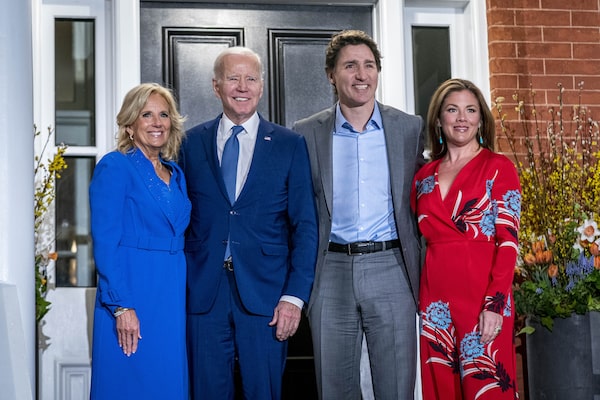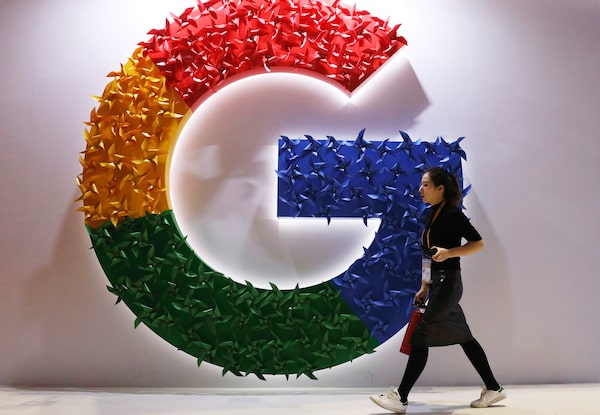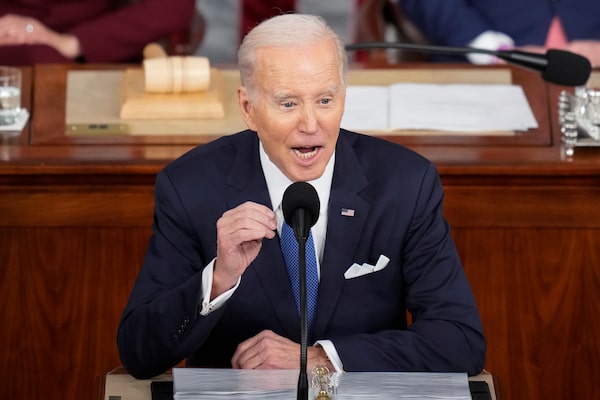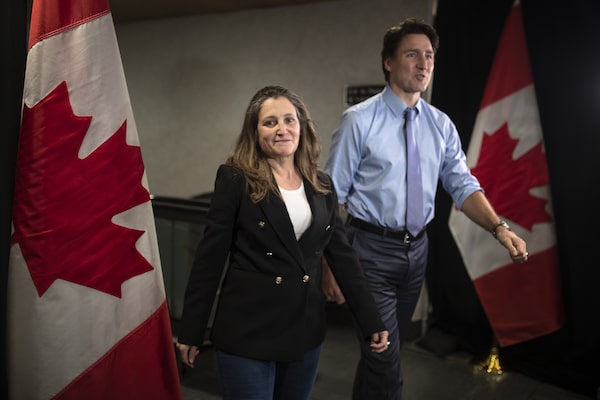U.S. President Joe Biden, along with first lady Jill Biden, arrived in Ottawa for his first official visit to Canada this week. Mr. Biden made an address to Parliament on Friday. Throughout his address, he underscored the far-reaching ties between Canada and the U.S.
During his visit, Mr. Trudeau and Mr. Biden announced the renegotiated Safe Third Country Agreement that will take effect at midnight Friday. That means police will begin turning away migrants crossing into Canada at unofficial points of entry early Saturday.
Every president since Franklin Roosevelt, apart from Gerald Ford and Jimmy Carter, has visited Canada during their time in office. Traditionally, the visit happens within the first few months of the president taking office. But COVID-19 restrictions and the war in Ukraine has delayed Mr. Biden’s Canadian visit until more than two years into his term.
Here’s what you need to know about Mr. Biden’s two-day visit.
The basics

President Joe Biden and first lady Jill Biden as they arrive to visit with Prime Minister Justin Trudeau and Sophie Gregoire Trudeau.Andrew Harnik
When is Joe Biden set to visit Canada?
Joe Biden is in Ottawa until Friday. It is his first official visit to Canada since becoming president in January, 2021.
What is the schedule for his two-day visit?
Thursday:
- The Bidens and their delegation landed in Ottawa on Air Force One on Thursday evening and were greeted by Finance Minister Chrystia Freeland, Foreign Affairs Minister Mélanie Joly, the American ambassador to Canada, David Cohen, and Canada’s envoy in the U.S., Kirsten Hillman.
- Mr. Biden held his first meeting with Governor-General Mary Simon upon arriving at the Ottawa airport.
- Prime Minister Justin Trudeau and Sophie Grégoire Trudeau hosted the Bidens at Rideau Cottage for a private gathering at their residence.
Friday:
- A welcoming ceremony was held for the Bidens in the West Block of Parliament Hill. Dignitaries from the House of Commons and Senate, including the Speakers from each chamber and the leaders of each elected party, joined.
- Mr. Biden and Mr. Trudeau held a bilateral meeting in the Prime Minister’s Office.
- The visit extended to a wider meeting between Mr. Biden, his delegation, Mr. Trudeau and Canadian ministers, including Ms. Freeland, Ms. Joly, Defence Minister Anita Anand and Trade Minister Mary Ng.
- Mr. Biden addressed Parliament by mid-afternoon, approx. 1:50 p.m. ET.
- Mr. Biden and Mr. Trudeau answered questions from the parliamentary press gallery and White House reporters for a joint media availability.
- The First Lady had a separate program alongside Ms. Trudeau, including a discussion with youth at the Rideau Curling Club and a visit to the National Gallery of Canada.
- A formal dinner was held for the President and First Lady at the Aviation and Space Museum, where hundreds of dignitaries, including Canadian ministers, MPs, ambassadors, Indigenous representatives and actors were invited. Mr. Trudeau cracked jokes about Canadian celebrities in the room who became famous after working in the United States, including actors Eugene Levy and Catherine O’Hara.
Key issues on the agenda
Mr. Biden and Mr. Trudeau were expected to hold informal and formal discussions on a number of pressing issues, including:
- trade;
- climate change;
- irregular immigration into Canada by the Roxham Road crossing;
- Arctic security;
- the humanitarian and political crisis in Haiti;
- the war in Ukraine;
- Chinese and foreign interference;
- the recent turmoil in the banking world, such as the recent failure of Silicon Valley Bank.
The Parliament address
Mr. Biden says his country and Canada will defend NATO territories and continue to stand with Ukraine as it battles Russia’s invasion.
In a speech to the House of Commons, Biden says that “an attack against one is an attack against all.”
Biden also discussed the importance of the North American Aerospace Defense Command, known as Norad.
He announced that the U.S. and Canada plan to update the Safe Third Country Agreement, a statement that earned a standing ovation.
The U.S. president used part of his speech to draw attention to the transition to green technology.
Trade Minister Mary Ng, Finance Minister Chrystia Freeland and Innovation Minister François-Philippe Champagne shared fist bumps when he mentioned that the U.S. and Canada have the most prosperous nations when it comes to diversifying their economies.
The federal NDP caucus, along with some Liberals, erupted into cheers when Biden called himself a “pro-union man.”
Former prime minister Jean Chrétien, former Ontario premier Dalton McGuinty and Michael Spavor and Michael Kovrog, two Canadians whom China imprisoned for more than 1,000 days, are among notable guests in the House of Commons.
The key themes
Migration, Roxham Road and the Safe Third Country Agreement
A family of asylum seekers from Colombia is met by RCMP officers after crossing the border at Roxham Road.Ryan Remiorz/The Canadian Press
Canada and the United States reached a deal to stem the flow of asylum seekers into this country by closing unofficial crossings such as Quebec’s Roxham Road as of midnight on Saturday.
Mr. Trudeau has been under increased pressure from the Quebec government to end the irregular migration at Roxham Road, an unofficial border crossing between New York and Quebec. Last year, almost 40,000 people arrived through the unofficial entry point.
Canada’s defence spending on NORAD and security
A suspected Chinese spy balloon drifts to the ocean after being shot down off the U.S. coast on Feb. 4.RANDALL HILL/Reuters
Canada will speed up deployment of a new high-tech radar system to upgrade North American air defences and retrofit military bases to accommodate the new American-made warplane that Ottawa is buying, Prime Minister Justin Trudeau announced during Mr. Biden’s visit to Canada on Friday.
The Globe reports that the White House wants Canada to spend more and act faster to modernize NORAD, but Canada’s position is that Ottawa has already announced significant investments in defence spending.
Last year, Defence Minister Anita Anand announced a $4.9-billion commitment over six years to upgrade air defences to address the growing threat posed by hypersonic missiles and advanced cruise missile technology developed by China and Russia. However, it has not yet disclosed how quickly that money will roll out.
The U.S. also wants to ensure that the upgrades are made in time for the delivery of Canada’s newly purchased F-35s. The first of those fighter jets are scheduled to arrive in 2026.
The impact of Bills C-11 and C-18 on U.S. companies

U.S. trade associations say that Canada’s online news and online streaming bills will disproportionately target U.S. companies like Google and Facebook.Ng Han Guan/The Associated Press
During his visit Mr. Biden was urged to escalate U.S. concerns about the impact of two Canadian bills – C-18 and C-11 – on Google, Facebook, Netflix, Disney+ and Amazon Prime.
U.S. trade associations say that Canada’s online news and online streaming bills will disproportionately target U.S. companies. Meanwhile, U.S. Trade Representative Katherine Tai has expressed disquiet about the bills’ financial implications for U.S. companies in meetings with Canada’s Trade Minister Mary Ng.
- Bill C-18, or the online news bill, now being discussed in the Senate, would make Facebook and Google compensate Canadian news outlets for publishing and linking to their work.
- Bill C-11, the online streaming bill, would make streaming platforms such as Disney+, Netflix, Amazon Prime and YouTube promote Canadian films, TV and music, and contribute financially to Canada’s cultural industries.
Officials from the Prime Minister’s Office have confirmed that the disputes would be among the issues discussed during the visit.
The implications of Buy America policies on Canada

President Joe Biden delivers his State of the Union address on Feb. 7, in Washington.Alex Brandon/The Associated Press
Another key focus of Biden’s visit in Canada was his emphasis on Buy America and how that will affect the Canadian trade market.
In his address, Mr. Biden tried to repeatedly reassure Canadians that his government’s vast subsidies for American companies to spur clean energy will not disadvantage those north of the border.
In the first few months of his presidency, Mr. Biden announced stronger Buy American provisions that would require goods bought by the U.S. federal government – from vehicles to construction materials – to contain 75 per cent U.S.-made content by 2029.
In his 2023 State of the Union address, Mr. Biden strengthened the policy by requiring the use of American-made manufacturing products such as lumber, glass, drywall and fibre optic cable in all government infrastructure projects.
The Globe and Mail reports that Canada will seek to ensure domestic businesses are not affected by Mr. Biden’s latest push to advance Buy America policies, which could block Canadian businesses from accessing certain sectors of the American market.
Instead, Ottawa is hoping that Canada can be included in renewed Buy America provisions to ensure Canadian exporters still have access to the U.S. market.
Inflation Reduction Act and spurring a clean economy

Ms. Freeland has said Ottawa will roll out more initiatives to spur a clean economy in next week’s federal budget.NICK IWANYSHYN/The Canadian Press
Another key question for Canada is how it will respond to the Inflation Reduction Act, a US$369-billion spending package brought in by the Biden administration, to spur the transition to the clean economy.
The Inflation Reduction Act, signed into law last August by Mr. Biden, invests in everything from critical minerals to battery manufacturing, electric vehicles, and clean electricity, including hydrogen.
Canadian climate groups have been urging Ottawa to pursue a “made-in-Canada” response to U.S. clean energy incentives.
On Monday, Mr. Freeland signalled that the March 28 budget will include ways to keep Canada competitive as countries transition their economies to cleaner energy and technologies. She also highlighted the role Canada can play with the U.S. economy in a pre-budget speech.
“Our allies are moving quickly to friendshore their economies and build their critical supply chains through democracies like Canada’s,” she said. “From energy to critical minerals, Canadian workers can be the ones to provide our allies with the resources they need.”
With reports from Adrian Morrow, Marieke Walsh, Bill Curry and The Canadian Press.
For subscribers: Get exclusive political news and analysis by signing up for the Politics Briefing.